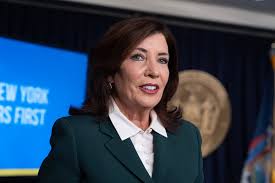On Thursday, New York Governor Kathy Hochul signed into law a new measure that holds major fossil fuel polluters financially accountable for the damage caused by extreme weather events. These events, which are becoming more frequent and severe, are driven by greenhouse gas emissions resulting from the combustion of fossil fuels.
The legislation, known as the Climate Change Superfund Act, targets companies responsible for the majority of carbon emissions between 2000 and 2024. Under this law, these companies will be required to pay approximately $3 billion each year for the next 25 years. The funds generated by these payments will be used to repair the damage caused by the escalating effects of climate change, including the health, safety, and environmental consequences New Yorkers are increasingly facing.
Governor Hochul emphasized the growing burden on the state, stating that New Yorkers are now dealing with billions of dollars in costs due to extreme weather, such as record rainfall, heatwaves, and coastal storms. These events are linked to the actions of polluting companies that have long contributed to environmental harm.

This new law is inspired by the original Superfund law, enacted in 1980, which requires companies to pay for the cleanup of hazardous waste caused by incidents like oil spills and chemical leaks.
Similarly, New York’s law seeks to address the long-term environmental damage resulting from fossil fuel pollution. It focuses specifically on the emissions from fossil fuel combustion, which contribute to global warming and exacerbate extreme weather events like floods, hurricanes, and severe storms. Experts agree that these weather patterns are becoming increasingly frequent as a result of the accumulation of greenhouse gases in the atmosphere.
The new law in New York is designed to ease the financial burden on taxpayers, who currently shoulder much of the cost for cleanup and mitigation following extreme weather events. The legislation specifically targets oil and gas companies, which are responsible for over a billion tons of greenhouse gas emissions worldwide over the past 24 years.
Lee Wasserman, director of the Rockefeller Family Fund, a nonprofit that advocated for the law, emphasized the fairness of making climate polluters pay their share. “Nothing could be fairer than making climate polluters pay,” he said.
However, some critics argue that the law unfairly singles out the energy sector and large corporations. Ken Pokalsky, vice president of the Business Council, expressed concern that the law perpetuates the idea that the fuel industry and big businesses are the sole cause of climate change. He pointed out that society as a whole has benefited from the use of fossil fuels during the period covered by the law, at a time when alternative energy sources were not widely available.
The funds raised through the law will be used for various climate resilience projects, including restoring coastal wetlands, upgrading infrastructure like roads and bridges, improving stormwater drainage systems, retrofitting buildings, and supporting recovery efforts from natural disasters. The money will also go toward health programs to address illnesses and injuries linked to climate change.
New York becomes the second state, after Vermont, to enact a version of the Superfund Act aimed at addressing climate change. Both states, along with much of the Northeast, have faced costly and dangerous flooding in recent years. In New York, extreme weather events this year have ranged from wildfires during a severe drought to a lake-effect snowstorm, prompting a state of emergency declaration.
State Senator Liz Krueger, who sponsored the legislation, warned that the cost of repairing and preparing for extreme weather caused by climate change could exceed $500 billion by 2050, or over $65,000 per household. This does not include the human toll from climate-related disruptions, injuries, and deaths.
Despite the law’s passage, experts anticipate legal challenges. Michael Gerrard, an environmental law professor at Columbia University, predicted that corporations will argue that it is unconstitutional for individual states to set national climate policy. This issue was raised earlier by the Business Council in a memo to the governor’s office, and later in a letter to Governor Hochul from various industry groups urging her to veto the law.
The Department of Environmental Conservation has three years to finalize the law’s regulatory details, with the first penalties expected to be levied in 2028. New York’s legislation could pave the way for other states, such as Maryland, Massachusetts, New Jersey, and California, to pass similar laws in the near future. New Jersey State Senator John F. McKeon, who is sponsoring a similar bill in his state, expressed optimism that the law would gain traction across the nation.
While some opponents argue that the law will lead to higher prices from energy companies, economists suggest that, since the fees are based on past emissions and oil prices are determined by the global market, future costs are unlikely to be impacted.


Comments are closed, but trackbacks and pingbacks are open.